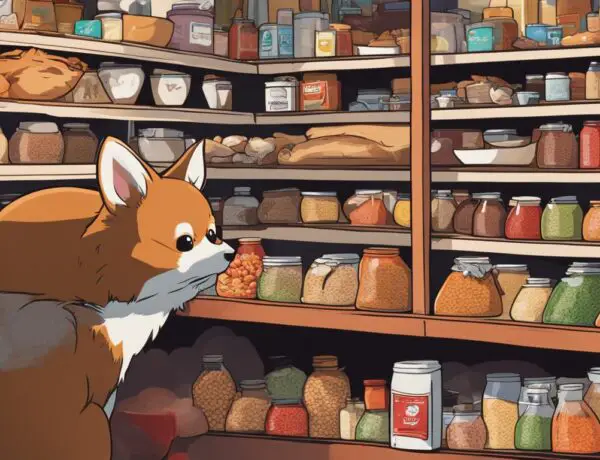When I lost my beloved pet, I experienced a wave of emotions that I couldn’t fully articulate. The grief and sorrow I felt were deep and profound, but it seemed as though others didn’t fully understand the magnitude of my loss. This is a common experience for those who have lost a pet, and it’s important to acknowledge that grieving the loss of a pet is a normal and valid process.
It’s important to remember that the grief process is not linear. It can involve a range of emotions, from denial and anger to guilt, sadness, and eventually acceptance. I had to allow myself to mourn the relationship I had with my pet and gradually find a way to remember them with decreasing sadness as I accepted their loss.
Key Takeaways:
- Coping with pet bereavement involves a range of emotions and stages of grief.
- Grieving the loss of a pet is a normal and valid process.
- Allowing yourself to mourn the relationship and accepting the loss is an important part of the healing process.
- Seeking support from others who have experienced pet loss can help in coping with the grief.
- Remembering and honoring your pet’s life through memorial rituals can provide comfort and healing.
The Intensity of Pet Loss: Why It Hurts So Much
The loss of a pet can be incredibly painful and can trigger overwhelming emotions. Pets often hold a special place in our hearts as beloved family members and provide companionship, joy, and even a sense of purpose.
“Pets are not our whole life, but they make our lives whole.” – Roger Caras
The level of grief experienced may vary depending on factors such as the significance of the pet in your life, their role in your day-to-day routine, and the circumstances of their death.
The Emotional Impact of Pet Loss
The emotional impact of losing a pet can be profound. Our pets become a source of unconditional love and provide us with a sense of emotional support. They are always there for us, offering a comforting presence and a listening ear. When they are no longer with us, we can feel a deep void in our lives, leading to feelings of emptiness, loneliness, and even depression.
Moreover, our pets often serve as faithful companions throughout various life events, providing us with a sense of stability and routine. Their presence can bring joy and happiness to our daily lives, and their absence can leave us feeling lost and disconnected.
A Pet as a Family Member
For many pet owners, their furry friends are not just pets; they are cherished family members. Pets offer unconditional love, loyalty, and an unwavering sense of companionship that mirrors the bonds we share with our human loved ones.
“Family isn’t always blood. It’s the people in your life who want you in theirs; the ones who accept you for who you are. The ones who would do anything to see you smile and who love you no matter what.” – Unknown
When we lose a pet, we mourn not only the physical presence but also the loss of a significant relationship. They become our confidants, playmates, and sources of comfort during tough times. The intensity of pet loss is rooted in the deep emotional connection and profound love we feel for our furry family members.
Validating the Emotional Impact
It’s important to acknowledge and validate your feelings of loss after the death of a pet. You may experience a wide range of emotions such as grief, sadness, anger, guilt, and even numbness. It’s vital not to feel guilty or ashamed for grieving the loss of your animal companion.
| Emotional Impact of Pet Loss | Common Feelings |
|---|---|
| Loss of Companionship and Unconditional Love | Grief, Loneliness, Emptiness |
| Disruption of Daily Routine | Feeling Lost, Disconnected |
| Loss of a Significant Relationship | Heartache, Sadness, Longing |
Remember, the intense pain and emotional impact you feel after losing a pet are valid and deserve recognition. Everyone experiences grief differently, and there is no right or wrong way to mourn the loss of your beloved pet.
Understanding the Grieving Process
Grieving the loss of a pet is a highly individual experience. It can involve various stages of grief such as denial, anger, guilt, depression, and eventually acceptance and resolution. However, it’s important to note that grief does not follow a specific timeline or pattern. While some people may progress through these stages linearly, others may experience cyclical grief with waves of highs and lows.
Each person’s journey through pet loss grief is unique and should be respected. There is no right or wrong way to grieve, and it’s crucial to be patient with yourself and allow the grieving process to unfold naturally. Some days may be more difficult than others, and that’s okay. It’s important to lean on your support system and seek solace in shared experiences with others who have also experienced pet loss.
“Grief never ends… But it changes. It’s a passage, not a place to stay. Grief is not a sign of weakness, nor a lack of faith… It is the price of love.”
– Anonymous
It’s important to remember that the healing process takes time. Allow yourself to feel the pain and sadness that comes with pet loss, as these emotions are a natural part of the grieving process. It’s also important to engage in self-care practices that support your emotional well-being. This may include journaling, exercising, seeking professional help if needed, and engaging in activities that bring you joy and comfort.
Coping with the Stages of Grief
While grief may not follow a linear path, understanding the common stages can help you navigate the healing process. Here are the typical stages of grief:
- Denial: Initially, you may find it difficult to accept the reality of your pet’s loss. Denial serves as a defense mechanism, allowing you to gradually come to terms with the truth.
- Anger: Anger is a normal response to loss. You may feel anger towards yourself, others, or even your pet for leaving you. It’s important to express and process these emotions in healthy ways.
- Guilt: Feelings of guilt are common after the loss of a pet. You may question whether you could have done more or made different decisions. Remember that you did your best and that no one is perfect.
- Depression: Sadness and depression are natural responses to pet loss. You may feel a deep void and struggle with daily activities. It’s important to reach out for support during this time.
- Acceptance and Resolution: Over time, you will come to accept the reality of your pet’s loss and find ways to honor their memory. While the pain may never fully go away, you can find comfort in happy memories and gradually open your heart to new connections.
| Stage of Grief | Characteristics |
|---|---|
| Denial | Avoidance, shock, disbelief |
| Anger | Feelings of outbursts, frustration, irritability |
| Guilt | Self-blame, remorse, feelings of responsibility |
| Depression | Sadness, emptiness, withdrawal |
| Acceptance and Resolution | Reaching a point of peace and healing |
Coping Strategies for Dealing with Pet Loss
Sorrow and grief are normal responses to the loss of a pet. It’s important to give yourself permission to feel and express these emotions without judgment. When coping with pet loss, it’s essential to remember that healing takes time and that everyone grieves differently. Here are some strategies that can help you navigate the grieving process and find comfort:
- Reach out to others who have experienced pet loss: Connecting with people who understand what you’re going through can provide immense comfort. Share stories, memories, and emotions with others who have also loved and lost a pet. In online forums or support groups, you can find understanding and empathy. Together, you can share coping strategies and help each other heal.
- Participate in pet loss support groups: Support groups specifically designed for pet loss can provide a safe and non-judgmental space to share your feelings and experiences. These groups often offer guidance and resources to help you navigate the grief journey. Many pet loss support groups are available online, making it easier to connect with others who are going through similar experiences.
- Engage in memorial rituals: Honoring your pet’s life and memory can be a healing experience. Consider creating a scrapbook with photos, writing a letter to your pet, or planting a tree in their honor. These rituals can provide a sense of closure and give you a tangible way to cherish their memory.
Taking care of your physical and emotional needs is crucial during the grieving process. Make sure to prioritize self-care by:
- Getting enough rest and sleep.
- Eating nutritious meals and staying hydrated.
- Engaging in regular physical activity to help manage stress and improve your mood.
- Seeking professional help if needed. A therapist or counselor can provide valuable support and guidance as you navigate the complexities of grief.
Remember, healing is a unique journey, and it’s important to be patient and compassionate with yourself. Through healthy grieving and seeking support, you can find solace and eventually cherish the memories of your beloved pet.
Coping Strategies for Dealing with Pet Loss
| Strategy | Description |
|---|---|
| Reach out to others who have experienced pet loss | Connect with individuals who can empathize and offer support during this difficult time. |
| Participate in pet loss support groups | Join a support group to share your feelings, experiences, and coping strategies with others who understand. |
| Engage in memorial rituals | Honor your pet’s memory through meaningful rituals, such as creating a scrapbook or planting a tree. |
| Take care of your physical and emotional needs | Ensure you prioritize self-care by getting enough rest, eating well, staying active, and seeking professional help when necessary. |
Supporting Seniors in Pet Loss Grief
The loss of a pet can be particularly challenging for seniors, especially if they live alone and relied on their pet for companionship and a sense of purpose. As a senior myself, I understand the deep bond that can form between older adults and their furry companions. The grief experienced when a beloved pet passes away is valid and can have a significant impact on the emotional well-being of seniors.
During this difficult time, it’s crucial for seniors to stay connected with friends and engage in activities that promote social interaction and physical well-being. Maintaining a support network is important for coping with pet loss grief. Reach out to friends and family members who understand the pain of losing a pet and can provide comfort and empathy. Talking about your pet and sharing memories can be therapeutic.
Additionally, finding new meaningful activities can help seniors navigate the grief process. Consider volunteering at a local animal shelter or participating in pet-related community events. Connecting with other pet owners can offer solace and camaraderie. Engaging in activities that bring joy and purpose can gradually ease the pain and provide a positive outlet for emotions.
Exercise is another powerful coping strategy for dealing with pet loss grief. Taking regular walks or engaging in gentle exercises, such as yoga or tai chi, can help release tension and improve overall well-being. Physical activity also stimulates the release of endorphins, natural mood-boosting chemicals in the brain, which can alleviate feelings of sadness.
While getting another pet may not be the right choice for everyone immediately after a loss, it’s worth considering once the grieving process has progressed. The companionship and unconditional love offered by a new pet can provide solace and a renewed sense of purpose. However, it’s important to take the time to heal and not rush into another pet adoption before you’re emotionally ready.
Grieving the loss of a pet is undoubtedly challenging for seniors, but it’s essential to remember that healing is possible. By staying connected with loved ones, engaging in meaningful activities, and taking care of your physical and emotional well-being, you can navigate the grief process and eventually find comfort in the memories of your beloved pet.
Helping Children Through the Grief of Pet Loss
The loss of a pet can be a traumatic experience for children, as they may deeply love and rely on their animal companions. It’s crucial for parents to support their children through the grieving process and teach them healthy coping strategies.
Children may express their grief differently from adults, and it’s important to create an open and safe environment for them to express their emotions. Providing reassurance, answering their questions honestly, and engaging in memorial activities can help children navigate pet loss grief.
It’s essential to validate children’s feelings and let them know that it’s normal to feel sad, angry, or confused after losing a pet. Encourage them to talk about their emotions and memories, both positive and negative, as it allows them to process their grief.
Here are some coping strategies that can help children through the grief of pet loss:
- Encourage expression: Create a safe space for children to express their emotions through conversation, drawing, writing, or other creative activities. Encourage them to share their favorite memories of their pet and express any feelings of sadness or anger.
- Provide reassurance: Assure children that their emotions are valid and that pet loss grief is a normal part of life. Let them know that it’s okay to feel sad and that their feelings will lessen with time.
- Answer questions honestly: Children may have many questions about death and the loss of their pet. Be honest and age-appropriate in your responses, using language they can understand. Avoid euphemisms like “put to sleep” or “passed away” to minimize confusion.
- Engage in memorial activities: Create rituals or memorials to honor the pet’s life and provide closure. This can include planting a tree or flowers in their memory, creating a scrapbook with photos, or making a special item like a paw print keepsake.
- Seek support: Consider reaching out to support groups or organizations that specialize in helping children cope with pet loss grief. Connecting with others who have experienced similar loss can provide comfort and understanding.
Supporting Children’s Emotional Well-being
It’s important to pay attention to changes in children’s behavior and emotional well-being following the loss of a pet. Some children may struggle more than others and may require additional support. Watch for signs of prolonged sadness, withdrawal from activities, changes in appetite or sleep patterns, or difficulty concentrating.
If you notice concerning changes in your child’s behavior, consider seeking professional help from a therapist or counselor who specializes in grief counseling for children. They can provide individualized support and guidance to help your child navigate their grief journey.
Supporting children through the grief of pet loss is essential for their emotional well-being. By providing a safe and understanding environment and teaching them healthy coping strategies, parents can help their children navigate the complex emotions associated with the loss of a beloved pet.
Understanding Grief and Bereavement
Grief is a natural and universal experience that we all go through when we lose someone or something we love. Whether it’s the loss of a human family member or a beloved pet, the intensity of grief can be profound. Pets hold a special place in our lives, offering unconditional love and support, and their loss can be devastating.
Grief encompasses various physical, emotional, cognitive, social, and spiritual responses. It’s a complex and multifaceted process that affects each person differently. There is no right or wrong way to grieve, and it’s important to remember that grief is a normal and healthy part of the human experience.
During the grieving process, it’s common to experience a wide range of emotions. Sadness, anger, guilt, and even relief are all normal reactions. It’s essential to acknowledge and validate these emotions, allowing yourself to feel them without judgment or shame. Embracing your emotions can be a significant step towards healing and finding meaning in the loss.
“Grief, I’ve learned, is really just love. It’s all the love you want to give, but cannot. All of that unspent love gathers up in the corners of your eyes, the lump in your throat, and in the hollow part of your chest. Grief is just love with no place to go.”
The Normality of Grief
Grief is a natural response to loss, and it is not a sign of weakness or a lack of resilience. It’s important to understand that everyone grieves in their own way and at their own pace. Some may find solace in talking about their loss, while others may prefer to process their grief internally. There is no right or wrong way to grieve, and it’s crucial to be patient and compassionate with yourself.
“Grief never ends… but it changes. It’s a passage, not a place to stay. Grief is not a sign of weakness, nor a lack of faith… It is the price of love.”
The Universality of Grief
Grieving the loss of a pet is not merely limited to certain individuals or cultures. The experience of grief is universal and transcends borders and boundaries. People from all walks of life and backgrounds can empathize and relate to the pain of losing a cherished pet. Sharing stories and connecting with others who have experienced similar losses can be a powerful source of comfort and healing.
A Journey of Healing
The journey through grief and bereavement is unique to each individual. It’s important to remember that healing takes time and that there is no set timeline for grieving. Be patient with yourself and allow the healing process to unfold naturally. Seek support from friends, family, or support groups who can offer understanding and empathy. Engaging in self-care activities, such as exercise, journaling, or participating in memorial rituals, can also aid in the healing process.
| Benefits of Seeking Support: | Coping Strategies: |
|---|---|
|
|
|
|
Conclusion
Coping with the loss of a pet is a unique and personal journey. It takes time to heal and adjust to life without your beloved animal companion. Remember that grief is individual, and there is no right or wrong way to grieve.
Be kind to yourself, seeking support from understanding individuals or groups can be incredibly helpful as you navigate the process of healing after pet loss. Connecting with others who have experienced similar bereavement can provide comfort and validation for your emotions.
In this challenging time, finding comfort in memories and rituals that honor your pet’s life can be a source of solace. Reflecting on the happy, loving moments you shared with your pet can bring healing and serve as a reminder of the deep bond you had together.
While the pain of loss may never fully go away, opening your heart to new connections when the time feels right can help you find healing and bring joy back into your life. Whether it’s adopting a new furry companion or finding other ways to engage with animals, allowing yourself to experience the love and companionship of a pet again can be a beautiful part of the healing process.
FAQ
What is pet bereavement?
Pet bereavement refers to the deep sadness and grief experienced after the loss of a beloved pet.
Why does the loss of a pet hurt so much?
The loss of a pet can be extremely painful because pets often hold a special place in our hearts as beloved family members, providing companionship, joy, and a sense of purpose.
What are the stages of grieving after pet loss?
The stages of grieving after pet loss can vary, but they may include denial, anger, guilt, depression, and eventually acceptance and resolution.
How can I cope with the grief of pet loss?
Coping with the grief of pet loss can involve various strategies, such as seeking support from others who have experienced pet loss, participating in pet loss support groups, and engaging in memorial rituals to honor your pet’s life.
How can I support seniors in pet loss grief?
To support seniors in pet loss grief, encourage them to stay connected with friends, engage in activities that promote social interaction and physical well-being, maintain routines, consider new meaningful activities, and explore the option of getting another pet when ready.
How can I help children through the grief of pet loss?
To help children through the grief of pet loss, create an open and safe environment for them to express their emotions, provide reassurance, answer their questions honestly, and engage in memorial activities to honor the pet.
Is grief a normal response to losing a pet?
Yes, grief is a natural and normal response to losing someone or something we love, including the loss of a pet. It is a universal experience that everyone goes through.
How can I find comfort after pet loss?
Finding comfort after pet loss may take time, but it can be found in memories and rituals that honor your pet’s life. While the pain of loss may never fully go away, eventual solace can be found in the happy and loving moments shared with your pet and opening your heart to new connections when the time feels right.







No Comments